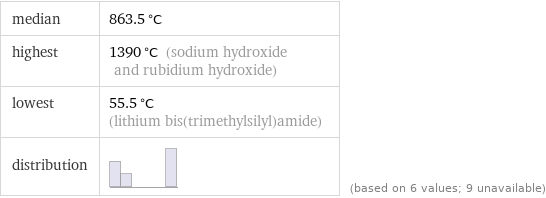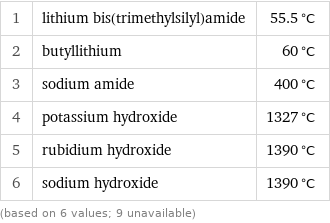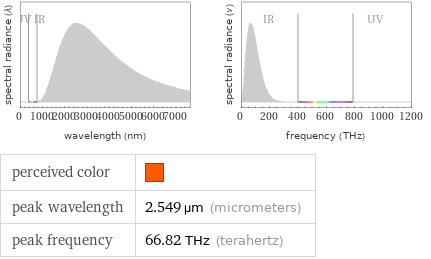Input interpretation

strong bases | boiling point
Summary

median | 863.5 °C highest | 1390 °C (sodium hydroxide and rubidium hydroxide) lowest | 55.5 °C (lithium bis(trimethylsilyl)amide) distribution | | (based on 6 values; 9 unavailable)
Entities with missing values

lithium hydroxide | sodium hydride | magnesium hydroxide | calcium hydroxide | lithium diethylamide | lithium diisopropylamide | strontium hydroxide | cesium hydroxide | barium hydroxide (total: 9)
Boiling point rankings

1 | lithium bis(trimethylsilyl)amide | 55.5 °C 2 | butyllithium | 60 °C 3 | sodium amide | 400 °C 4 | potassium hydroxide | 1327 °C 5 | rubidium hydroxide | 1390 °C 6 | sodium hydroxide | 1390 °C (based on 6 values; 9 unavailable)
Unit conversions for median boiling point 863.5 °C

1137 K (kelvins)

1586 °F (degrees Fahrenheit)

2046 °R (degrees Rankine)

690.8 °Ré (degrees Réaumur)

460.8 °Rø (degrees Rømer)
Comparison for median boiling point 863.5 °C

436.5 °C below to 163.5 °C above typical temperature of magma (700 to 1300 °C)

33.35 °C below large log fire temperature (1170 K)
Blackbody information for median boiling point 863.5 °C (degrees Celsius)

perceived color | peak wavelength | 2.549 µm (micrometers) peak frequency | 66.82 THz (terahertz)
Corresponding quantities

Thermodynamic energy E from E = kT: | 9.8 ceV (centielectronvolts)

Blackbody energy flux Φ from Φ = σT^4: | 94650 W/m^2 (watts per square meter)

Approximate luminous exitance from a planar blackbody radiator perpendicular to its surface: | 145 lx (lux)